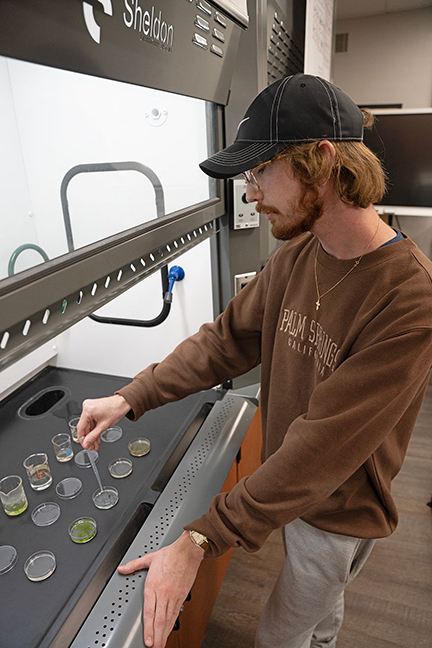MCC students continue to gain experience in seed grant research project
Meridian Community College students continue to dive into hands-on research as part of a project to develop affordable tools for detecting wildfires and other environmental hazards.
The project began with funding from the Mississippi NASA Space Grant and has grown opportunities for students to get real-world scientific experience, said Dr. Angie Carraway, MCC Space Grant Campus coordinator, chemistry instructor, and science and wellness division chair.
 The program started small, thanks to a special NASA seed grant designed to help launch
new research efforts. MCC initially focused on wildfire detection, with students conducting
chemical analyses to build a foundation for the project. Over time, the scope of the
work expanded to include algae research and climate science, areas with growing importance
and funding opportunities.
The program started small, thanks to a special NASA seed grant designed to help launch
new research efforts. MCC initially focused on wildfire detection, with students conducting
chemical analyses to build a foundation for the project. Over time, the scope of the
work expanded to include algae research and climate science, areas with growing importance
and funding opportunities.
This year’s research team includes three returning sophomores who worked on the project last year. Samuel Swanner, an aerospace engineering major; Alondra Arreola-Espino, a science major; and Kaitlyn Hebig, who plans to pursue a medical career, continue the program’s mission.
Work includes photographing algae in petri dishes and sending the images to collaborators at Mississippi State University for analysis. The team is also studying steam by boiling water and measuring its interaction with a grid, a step toward understanding environmental phenomena.
Funding remains critical to the project’s success. MCC recently received support from the Mississippi NASA EPSCoR (US Department of Energy’s Established Program to Stimulate Competitive Research) Research Infrastructure Development Seed Grant. This grant, which builds on the program’s original NASA Space Grant funding, has allowed the team to expand their work while focusing on creating small, low-cost systems for detecting environmental hazards.
MCC alumnus Dr. Blake Stuart played a role in helping secure the recent grant, offering his expertise in grant writing and research planning, Dr. Carraway noted.
The three sophomores agree their work is an investment in their futures. “This is helping us with problem-solving skills,” Swanner said. Hebig added, “It’s a resume builder.” Arreola-Espino noted the work “is teaching us to be patient and not rush the process.”
The students are earning one college credit per semester for their efforts.
MCC is one of the few community colleges in the state where students can engage in scientific research, Dr. Carraway said.
For more information, visit meridiancc.edu.

